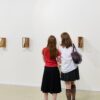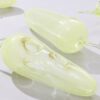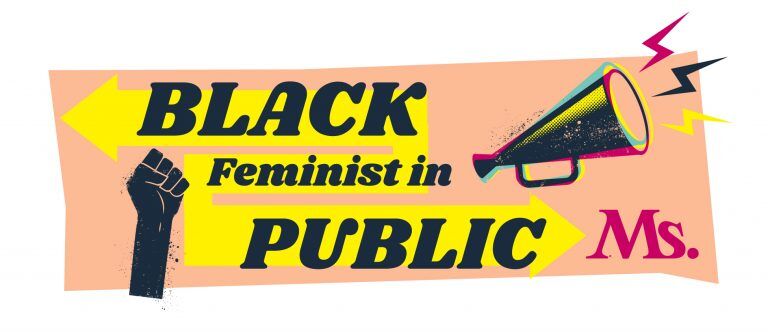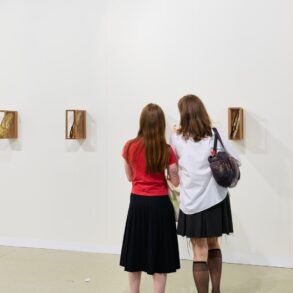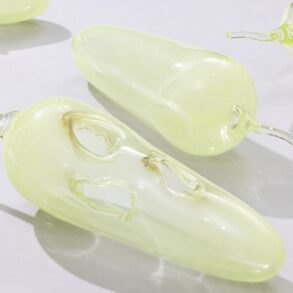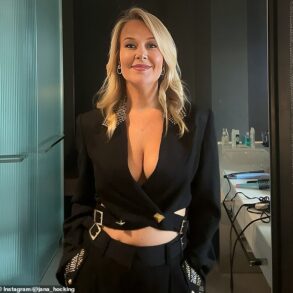Black Feminist in Public is a series of conversations between creative Black women and Janell Hobson, a Ms. scholar whose work focuses on the intersections of history, popular culture and representations of women of African descent.
Autumn Breon is a multidisciplinary artist who creates works from a queer Black feminist perspective. Using performance, sculpture and public installations, she often centers Black women’s histories and experiences through her art.
From her performance (Don’t) Use Me (2022), which raises awareness of Black women’s labor, to Protective Style (2023), which highlights a historic figure like South Carolina beautician Bernice Robinson, who used her hair salon to educate Black people to read and write in order to pass literacy tests to vote, Breon’s work is grounded in what she recognizes as a politics of care.
This principle foregrounds her latest performance, Dignity Denied (2025), which shines a light on the case of Adriana Smith, who was forcibly kept on life support due to Georgia’s abortion ban and fetal personhood laws.
Adriana Smith’s baby boy—whom Smith’s family named Chance—was delivered prematurely via cesarean section on Friday, June 13. He weighed 1lb 13oz, and is currently in the neonatal intensive care unit. Smith herself was removed from life support on Tuesday, June 17.
I had a chance to speak with Breon about her recent performances, activism and artwork.
Janell Hobson: What made you choose to create a performance around Adriana Smith?
Autumn Breon: Most of my work is inspired by collecting data. I pose a question and start with Black women for their responses and collect those responses and then share the information.
Adriana Smith is a Black woman in Atlanta who has been kept on life support against her will and against her family’s wishes because of Georgia’s six-week abortion ban. So, I wanted to show what lack of autonomy, what surveillance looks like and durational performance felt like the best way to highlight her situation.
Hobson: What is involved in this durational performance?
Breon: I share a location where I’ll be each day and for an hour each day, I lie down with sandbags that are weighted onto my body. I monitor my vitals so those are available for the public to see, and my body becomes an altar.
It’s a site of memory, but also a way to make sure, quite frankly, that people know who Adriana Smith is and what’s happening.
I’m based in Los Angeles, my studio is in Inglewood, but I was just in New York for a different performance. I was in the Lower East Side for that day when I did my hour. I used weights that I got from the Satellite Gallery to put on myself.
The goal is to make sure that people have awareness of Adriana Smith first and foremost, to make it clear that this could be any of us. I also needed a place to put my rage. And when I would tell other people about Adriana Smith, they had a similar rage because they didn’t know about it. So that’s why I also wanted my body to be an altar so that there’s a place where people can put their rage.
Hobson: That sounds heavy, both literally and figuratively!
Breon: It is. The soundscape that plays is the sounds of an ICU, the sounds of life support, like a ventilator, a heart rate monitor. You hear that in the soundscape. And then I layered that with me reading excerpts from Audre Lorde’s journals after she was diagnosed with cancer. It’s an interesting way for me to weave in other Black feminists that have also dealt with a reckoning around what the body represents. I layered that on top of the sounds of an ICU, and that’s what plays for the hour.
Lorde’s words really inspired me, just thinking about the intentionality of not suffering in isolation and not aiding in oppression.
Hobson: That’s a profound performance, especially concerning our present-day post-Roe environment in the wake of the Dobbs Supreme Court decision.
Breon: Adriana Smith is not the first victim, and as long as policies like this are in place, unfortunately she won’t be the last.
Hobson: You talk about durational performance. How long will you be performing this piece?
Breon: I’m going to go as long as she’s kept on life support. …
I always show how many days her dignity has been denied, and I add a new temporary tattoo, a marking to my body each day that says “dignity denied” in red letters. I’ll keep going as long as her dignity is denied.
Sometimes I perform in a park. Sometimes it’s in a backyard. I share what the location is typically that morning, that day for security purposes. And folks show up if they need to, but they show up virtually as well.
Despite the state of our country, despite the intentional and violent suppression that we’re living through, our care for each other is what’s going to get us through, but also what’s going to help us build something much better.
Autumn Breon
Hobson: Why did you choose this form of protest?
Breon: For this, I wanted it to feel very intimate. I knew that it would be my body in conversation with public places, and I wanted a visual juxtaposition and duration. A durational performance just made the most sense because the theater of surveillance is a part of this case. I needed to make that abundantly clear for the viewer. That is what is at stake here.
Hobson: How do your audiences react to this?
Breon: For many, this is an introduction [to the case]. But someone on social media left a comment where they said, “Hey, I just want to send you protection for what you’re doing.” And that felt so personal. There was so much care, so much genuine connection. That was a poignant reminder that, despite the state of our country, despite the intentional and violent suppression that we’re living through, our care for each other is what’s going to get us through, but also what’s going to help us build something much better.
We already have these technologies for us to care for each other, and we need it. We need it the most right now. We can’t depend on the policies. We can’t depend on our politicians. We have to depend on and build infrastructure around care for each other.
Hobson: That’s such an important lesson, especially for reproductive justice.
Breon: Reproductive justice, that’s part of the world that I imagine I want to live in. That’s non-negotiable for me, reproductive freedom as harm reduction. It’s the antidote to the violence that we’ve experienced in this country since we’ve been here. We’re far overdue to have these basic rights and basic access to care. It boils down to care for me.
Last year I was touring a piece called “The Care Machine.” It’s a hot pink vending machine. I retrofitted it and everything in it is free.
Hobson: A vending machine “selling” care?
Breon: Yes. I asked Black women: “What items provide care? And what reminds you of care?” And then I filled the machine with that. I traveled around the country, and it would pop up in different places, and we always had voter registration every time the Care Machine [appeared]. It had lip gloss, edge control, abortion pill resources, emergency contraception, condoms, lube—all these items that I believe should be super accessible. It should be easy to get items that provide care, reproductive care. It should be as easy to get any of that as it is to get anything from a vending machine. And that was just about ease and convenience.
Hobson: And accessibility…
Breon: Exactly. Care is the focus, which is also part of “Dignity Denied,” but the approach is clearly different.
“Dignity Denied” is showing what it looks like when care is not accessible. And I think that’s just as important for us to understand. Again, we must understand what the new world can look like. We must understand what we are deserving of, what we need access to, but also what’s at stake.
Hobson: What is this new world, and how does your art move us in that direction?
Breon: All my artwork, performances, sculptures, even installations, they all come from a planet that I’ve imagined called Planet Esoterica, and it’s where ancestors go when they leave this planet. We might call it dying, but they’re just transitioning to Planet Esoterica. It’s 300 light-years from Inglewood. It’s a Black matriarchy. And wormholes, pathways, these portals that exist through my performances, through my objects, those are ways that folks in Esoterica send messages to humans on planet Earth to help us get through our time on this planet.
All my performances are inspired by queer Black feminist theory, and the intention is to model a different way of being, a different framework that the audience can eventually adopt and use in their own day-to-day lives.
That’s non-negotiable for me: reproductive freedom as harm reduction. It’s the antidote to the violence that we’ve experienced in this country since we’ve been here.
Autumn Breon
Hobson: How did you imagine Planet Esoterica? Are you drawing from concepts like Afrofuturism or different African spiritualities?
Breon: My background is in engineering, and specifically aeronautics and astronautics. And that inspires so much of how I think about creativity and how I world-build.
Esoterica came from me needing a vocabulary and a container for all these elements of a future world that I need, a place where I feel safe. I use art to show how we make that a reality in the present day, not something that we have to wait for in the future, or something that exists in a different place. I wanted a place that I imagine for safety and care to have vocabulary. So that’s where Esoterica came from.
I’m inspired by many means and modes of spirituality: Ifa, Hoodoo, Voodoo, even other types of organized religions like Catholicism. I grew up in an African Methodist Episcopal church. When I visit a cathedral, I don’t practice Catholicism, but I love this shared understanding that the objects that are at an altar or an altarpiece are important. And I wanted that same kind of assigned importance for queer Black bodies, for the histories that inspire my queer Black feminist theory in action.
Hobson: You talk of wormholes as well as the ancestral realm. I’m also thinking of the multiverse and how we can bring those concepts closer together. Is that what you’re trying to do with your art?
Breon: I think that these moments within the timeline of human history feel closer and have been more attainable in unexpected ways, in unexpected places. I think that space and time are compressed; I’ve been thinking of it as spatio-temporal glitches, and it might be like in an instant, where something that seemed impossible suddenly becomes possible. Like the Harriet Tubman-led Combahee River Raid. The Combahee River Collective obviously influences my work, and it’s why I start with Black women when I’m posing a question and collecting data.
For that many people to have been freed, one night and in one place, that’s a spatio-temporal glitch. There were so many bodies that got to freedom at once. That’s when a wormhole is activated, a wormhole to liberation is activated in moments like that.
Hobson: I appreciate you bringing in these elements of history, as well as science and art and Black feminist theory, to fuel creativity and a different vision for how we can all live in the world.
Breon: I know that I communicate with my ancestors, and they communicate with me. Esoterica is a neat container for a truth that I’m already aware of. That’s why I’m not intimidated by the current reality of policies and policymakers. You might have a six-week abortion ban. You might have whatever other oppressive policies in place. We have always found ways to aid and abet each other, and we always will.
This post was originally published on this site be sure to check out more of their content

